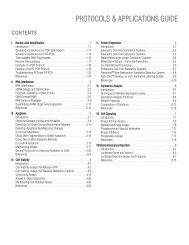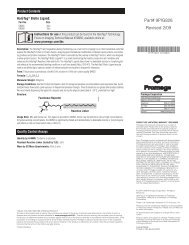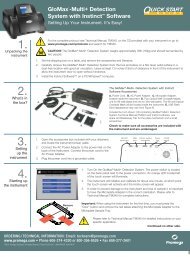2012 Promega catalogue
2012 Promega catalogue
2012 Promega catalogue
Create successful ePaper yourself
Turn your PDF publications into a flip-book with our unique Google optimized e-Paper software.
Cell Signaling<br />
TSAP Thermosensitive Alkaline Phosphatase<br />
Product Size Cat.# Price ($)<br />
TSAP Thermosensitive Alkaline Phosphatase 100 units M9910 113.00<br />
For Laboratory Use.<br />
Description: TSAP Thermosensitive Alkaline Phosphatase catalyzes the<br />
removal of 5´ phosphate groups from DNA, thus preventing the recircularization<br />
and religation of linearized cloning vector DNA during ligation. It is effective on<br />
3´ overhangs, 5´ overhangs and blunt ends. It is also useful for preparing DNA<br />
for 5´ end-labeling by removing existing phosphate groups from the 5´ end.<br />
TSAP is irreversibly inactivated by heating at 74°C for 15 minutes.<br />
Therefore, a DNA cleanup step is not required before proceeding to a ligation<br />
reaction. TSAP is fully active in all restriction enzyme reaction buffers tested<br />
under the conditions listed below, facilitating a streamlined restriction digestion,<br />
dephosphorylation and ligation reaction.<br />
Features:<br />
• Easy To Use: TSAP is active in all <strong>Promega</strong> restriction enzyme buffers,<br />
eliminating any cleanup steps or buffer swaps.<br />
• Convenient: TSAP is irreversibly inactivated by heating at 74°C for<br />
15 minutes. This allows streamlining of the restriction enzyme digestion,<br />
dephosphorylation and ligation procedure by eliminating the need for<br />
cleanup after alkaline phosphatase treatment.<br />
• Blue/White Cloning-Qualified: <strong>Promega</strong>’s blue/white cloning assay<br />
provides a higher level of quality control for enzymes used in cloning<br />
applications.<br />
• Provided with <strong>Promega</strong> MULTI-CORE Buffer.<br />
Storage Conditions: Store at –20°C. See the expiration date on the label.<br />
Protocol Part#<br />
TSAP Thermosensitive Alkaline Phosphatase Protocol 9PIM991<br />
Comparison of Alkaline Phosphatases.<br />
TSAP CIAP*<br />
Heat Inactivated Yes<br />
No<br />
Inactivation Temperature 74<br />
N/A<br />
Incubation Time 15 min 2 × 30 min<br />
Special Buffer Required/Recommended<br />
Active in all <strong>Promega</strong><br />
No<br />
Yes<br />
Restriction Enzyme Buffers Yes<br />
No<br />
Units required in different RE Buffers 1–2<br />
N/A<br />
Blue/White Cloning-Qualified Yes<br />
Yes<br />
Only TSAP does not require a special buffer and is active in all <strong>Promega</strong> restriction<br />
enzyme buffers, making it the most convenient and cost-effective choice.<br />
CIAP = Calf Intestinal Alkaline Phosphatase<br />
For complete and up-to-date product information visit: www.promega.com/catalog<br />
9493LA<br />
Polymerases<br />
DNA Polymerase I<br />
Product Size Conc. Cat.# Price ($)<br />
DNA Polymerase I 500 u 5–10 u/µl M2051 128.00<br />
For Laboratory Use.<br />
2,500 u 5–10 u/µl M2055 483.00<br />
Description: DNA Polymerase I catalyzes the template-directed polymerization<br />
of nucleotides into duplex DNA in a 5´→3´ direction. DNA Polymerase I<br />
possesses a 3´→5´ exonuclease activity or “proofreading” function, which<br />
lowers the error rate during DNA replication, and also contains a 5´→3´<br />
exonuclease activity, which enables the enzyme to replace nucleotides in<br />
the growing strand of DNA by nick translation. The enzyme, purified from<br />
recombinant E. coli, is capable of catalyzing de novo synthesis of synthetic<br />
homopolymers and provides a convenient method for the preparation of a<br />
variety of defined DNA substrates.<br />
Features:<br />
• Flexible: DNA Polymerase I may be used in a variety of molecular<br />
applications.<br />
• May Be Heat-Inactivated: DNA Polymerase I is inactivated by heating at<br />
68°C for 10 minutes.<br />
• Provided with 10X Reaction Buffer: 500mM Tris-HCl (pH 7.2 at 25°C),<br />
100mM MgSO 4, 1mM DTT.<br />
Storage Conditions: Store at –20°C.<br />
Protocol Part#<br />
DNA Polymerase I Protocol 9PIM205<br />
DNA Polymerase I Large (Klenow) Fragment<br />
Product Size Conc. Cat.# Price ($)<br />
DNA Polymerase I Large (Klenow) 150 u 5 u/µl M2201 117.00<br />
Fragment<br />
For Laboratory Use.<br />
500 u 5 u/µl M2206 344.00<br />
Description: DNA Polymerase I Large (Klenow) Fragment is a DNA-dependent<br />
DNA polymerase that lacks the 5´→3´ exonuclease activity of intact E. coli<br />
DNA Polymerase I but retains its 5´→3´ polymerase, 3´→5´ exonuclease and<br />
strand displacement activities. The enzyme is a 68kDa C-terminal fragment of<br />
DNA Polymerase I. The 5´→3´ polymerase activity of Klenow Fragment can be<br />
used to fill in 5´-protruding ends with unlabeled or labeled dNTPs, to sequence<br />
single- or double-stranded DNA templates, for in vitro mutagenesis using<br />
synthetic oligonucleotides, for cDNA second-strand synthesis and to generate<br />
single-stranded DNA probes. The 3´→5´ exonuclease activity can be used to<br />
generate blunt ends from a 3´-overhang.<br />
Features:<br />
• Flexible: DNA Polymerase I Large (Klenow) Fragment may be used in a<br />
variety of molecular applications. It is also active in many <strong>Promega</strong> 1X<br />
restriction enzyme buffers.<br />
• May Be Heat-Inactivated: DNA Polymerase I Large (Klenow) Fragment is<br />
inactivated by heating at 75°C for 10 minutes.<br />
• Provided with 10X Reaction Buffer: 500mM Tris-HCl (pH 7.2 at 25°C),<br />
100mM MgSO 4, 1mM DTT.<br />
• Choose Your Configuration: Learn more about our custom options for<br />
this product at: www.promega.com/myway/<br />
Storage Conditions: Store at –20°C.<br />
Protocol Part#<br />
DNA Polymerase I Large (Klenow) Fragment Protocol 9PIM220<br />
89<br />
4<br />
Cloning and DNA Markers<br />
Section<br />
Contents<br />
Table of<br />
Contents
















